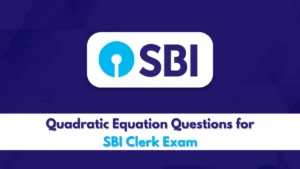Dear Students,
Quantitative Aptitude For SBI PO Exam 2018 (Week-01)
Quantitative Aptitude Section has given heebie-jeebies to the aspirants when they appear for a banking examination. As the level of every other section is only getting complex and convoluted, there is no doubt that this section, too, makes your blood run cold. The questions asked in this section are calculative and very time-consuming. But once dealt with proper strategy, speed, and accuracy, this section can get you the maximum marks in the examination. Following is the Quantitative Aptitude quiz to help you practice with the best of latest pattern questions.
Following the study plan for SBI PO Preliminary Examination 2018, the first week starts with practice questions on Number Series, Pie Chart DI, and More Questions Set. To ensure proper preparation of the section we advise you to go through all the questions sincerely and try to attempt each one of them. Afterward, match your solutions and the approach with the one that would be provided later. Practice more and more questions on the same section to enhance your grip over the topics. Following is the Quantitative Aptitude quiz to help you practice with the best of latest pattern questions.
Q1. In a factory men, women and children were employed in the ratio 8 : 5 : 1 to finish a job and their individual wages were in the ratio 5 : 2 : 3. Total daily wages of factory amounts to Rs. 318. Find the total daily wages paid to each category.
(a) Rs. 240, Rs. 60, Rs. 18
(b) Rs. 210, Rs. 70, Rs. 38
(c) Rs. 190, Rs. 95, Rs. 33
(d) Rs. 220, Rs. 68, Rs. 30
(e) None of these
Q2. One year ago the ratio between Laxman’s and Gopal’s salary was 3 : 4. The ratios of their individual salaries between last year’s and this year’s salaries are 4 : 5 and 2 : 3 respectively. At present the total of their salary is Rs. 4160. The salary of Laxman, now is:
(a) Rs. 1040
(b) Rs. 1600
(c) Rs. 2560
(d) Rs. 3120
(e) Rs. 4210
Q3. Sohan spends 23% of an amount of money on an insurance policy, 33% on food, 19% on children’s education and 16% on recreation. He deposits the remaining amount of Rs. 504 in bank. How much amount does he spend on food and insurance policy together?
(a) Rs. 3200
(b) Rs. 3126
(c) Rs. 3136
(d) Rs. 3048
(e) Rs. 4045
Q4. The marked price of a radio set is Rs. 480. The shopkeeper allows a discount of 10% and gain 8%. If no discount is allowed, his gain percent would be:
(a) 25%
(b) 18%
(c) 18.5%
(d) 20%
(e) 30%
Q5. Rahul bought two cycles for a total sum of Rs. 1,500. He sold one cycle at 20% loss and the other cycle at 20% gain. If the selling price of both the cycles is the same, find the cost price of the two cycles.
(a) Rs. 750 each
(b) Rs. 550, Rs. 950
(c) Rs. 500, Rs. 1000
(d) Rs. 600, Rs. 900
(e) None of these
Directions (6-10): The following pie-chart shows the distribution of chocolate (in degree) among children of different classes of Bal Bharti School. Study the chart carefully to answer the following questions.
Note: Some data are in degree while some data are in absolute value in the following chart.
Q6. Total no. of chocolates distributed among class V students is what percent of total chocolates distributed among class VI students (approximately)?
(a) 140%
(b) 125%
(c) 145%
(d) 120%
(e) 155%
Q7. If ratio of boys to girls in class I be 3 : 1 and each student get two chocolate then how many boys are there in class I who got Chocolates?
(a) 1402
(b) 1206
(c) 1602
(d) 1802
(e) 1600
Q8. What is the average no. of Chocolates distributed among students of class II and III together?
(a) 4210
(b) 4280
(c) 3036
(d) 3248
(e) 3642
Q9. Total Chocolates distributed among students of class II and class IV together is what percent more or less than the total no. of chocolates distributed among students of class VI and I together?
(a) 5% less
(b) 5% more
(c) 25% more
(d) 10% more
(e) 10% less
Q10. What is the difference between total chocolates distributed among students of class I, II and VI together and total chocolates distributed among students of class III, IV and V together?
(a) 2,136
(b) 4,236
(c) 4,136
(d) 4,436
(e) 3,136
Directions (11-15): What will come in place of question mark (?) in the following number series?
Q11. 1, 5, 29, 209, ?, 20789
(a) 2223
(b) 1889
(c) 1771
(d) 1828
(e) 2148
Q12. 71 , 88, 113, 150, 203, ?
(a) 412
(b) 328
(c) 276
(d) 282
(e) 316
Q13. 359, 437, 523, 615, 711, ?
(a) 809
(b) 812
(c) 936
(d) 984
(e) 778
Q14. 3, 5, 17, 97, 769, ?
(a) 9217
(b) 4609
(c) 6145
(d) 7681
(e) 7679
Q15. 15.5, 29, 56, 96.5, 150.5, ?
(a) 238
(b) 252
(c) 312
(d) 328
(e) 218
You may also like to Read:






 Simplification Questions for SBI PO Exam
Simplification Questions for SBI PO Exam
 SBI PO Quantitative Aptitude 2025, Impor...
SBI PO Quantitative Aptitude 2025, Impor...
 Quadratic Equation Questions for SBI Cle...
Quadratic Equation Questions for SBI Cle...





